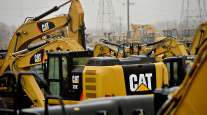Long-term Highway Funding Provides a Bright Spot for Caterpillar

PEORIA, Ill. — U.S. Sen. Dick Durbin recalled brightening Caterpillar Inc. CEO Doug Oberhelman’s day last year.
“I called Doug Oberhelman because for the first time in five or six years, we were able to get a long-term highway bill. He said it was the best news he’d heard in a long time,” recalled Durbin (D-Ill.).
“The highway bill also included support for the Export-Import Bank. I know that both of those things are critical for a manufacturer that employs thousands across Illinois and the nation.”
A five-year, $305 billion bill that was signed into law in December provides a modest increase to highway and transit spending. It also offers a ray of sunshine during what has been a dark period for Caterpillar, which has been dealing with all kinds of problems: a downturn in mining orders, a drop in construction equipment sales and the layoff of 10,000 workers over the next three years.
The passage of a highway bill means that state transportation departments and private contractors can plan on federal support for projects — and the possible purchase of road graders and other heavy equipment that Caterpillar sells.
“It will be helpful but not massively helpful,” said Kwame Webb, an analyst with Morningstar in Chicago.
“U.S. construction equipment sales are about 10 to 15% of Caterpillar’s revenue. It may encourage some purchases into the near term, but I would not expect it to be a huge swing factor.
“The bigger addition might be the fact that [the highway bill] also authorized the Export-Import Bank to be funded through 2019 since Caterpillar utilizes Ex-Im guarantees on $1 billion of loans per year.”
But the mere fact that a multiyear highway bill has become law is encouraging, said Mike DeWalt, the Caterpillar VP with responsibility for financial services.
“The highway bill is a good thing. We’d just like it to be 50% larger,” he said in an interview with the Journal Star last year.
Clint Drury, the new executive director of the West Central Illinois Building and Construction Trades Council, said the passage of a highway bill means jobs.
“It means more than the maintenance and asphalt overlay projects we’ve been doing,” he said. “It means jobs for operating engineers, laborers, carpenters, ironworkers, finishers as well as more apprentices.”
The Illinois Department of Transportation also issued a brief statement of support for the federal program. “We are pleased that there is a long-term federal surface transportation program in place to help build certainty into our programs,” spokesman Brian Williamsen said.
Mike Cullinan, owner of the R.A. Cullinan construction firm in Tremont who’s worked on numerous highway projects over the years, said it is a certainty that the highway bill doesn’t solve all the nation’s infrastructure problems.
“Overall, [the bill’s passage] is a positive, but a lot more needs to be done. People who hear that we passed a bill might think that we’ve solved something, when more revenues are needed,” he said.
“You hear about all these billions of dollars allocated for transportation, but fixing one bridge might cost $3 billion alone.”
Kevin Burke, executive director of the Springfield-based Illinois Asphalt Pavement Association, agreed that a long-term bill was a good thing but questioned the funding.
“No long-term sustainable funding source has been identified, plus funding is only guaranteed for the first three years. Transportation departments often plan out six or 10 years,” he said. “The bill is a good first step, but someone in the Illinois Legislature needs to step up to come up with a funding source.”
Durbin understands that more needs to be done.
“The highway bill is good, but it’s not good enough. Our infrastructure has so many needs,” he said. “I filled up on gas in Springfield recently and paid $1.67 a gallon. You could add 5 or 10 cents to that, and it wouldn’t even make a ripple to consumers.”
The federal Highway Trust Fund has kept fuel taxes unchanged since 1993: 18.4 cents a gallon on gasoline and 24.4 cents a gallon on diesel fuel.
Boosting a gas tax will take a new Congress, Durbin said.
“This one won’t do it, but it’s time to do it,” he said.




